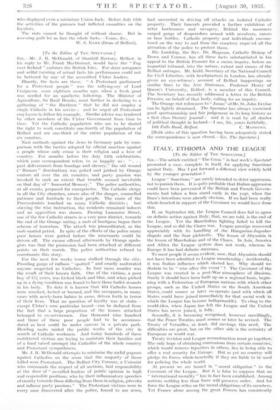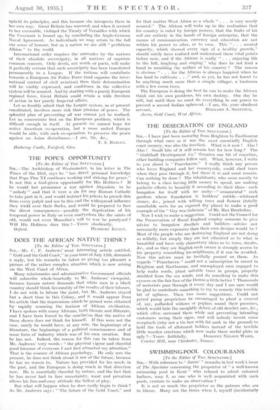ITALY, ETHIOPIA AND THE LEAGUE
[To the Editor of THE SPECTATOR.]
Sin,—The article entitled ‘` The Crisis " in last week's Spectator presented a case, complete in itself, for applying Sanctions against Italy. May I put forward a different view widely held by the younger generation ?
League " Sanctions " are surely intended to deter aggressors, not to punish them. It is quite probable that Italian aggression could have been prevented if the British and French Govern- ments had taken a firm stand early in the year, when the Duce's intentions were already obvious. if we had been really whole-hearted in support of the Covenant we would have done this.
If, on September 4th, the League Council does fail to agree on definite action against Italy, that, we are told, is the end q the League. Yet the Manchukuo fighting failed to kill the League, and so did the Chaco war. League prestige recovered appreciably with its handling of the Hungarian-Jugoslav dispute and the Saar plebiscite. The lesson of Abyssinia is the lesson of Manchukuo and of the Chaco. In Asia, America and Africa the League system does not work, whereas in Europe it has had definite Successes.
To most people it seems evident, now, that Abyssinia should not have been admitted to League membership ;
it was Italian influence which elected her. Why should we disdain to be "wise after the event" ? The Covenant of the League was created in a post-War atmosphere of illusions. Surely it should have been built up on a regional basis, begin- ning with a Federation of European nations with which other groups, such as the United States or the South American States, could sooner or later co-operate (and with which' all States could have joined immediately for that social work' in which the League has become indispensable). To cling to the world-idea, when Japan has left the League and the United States has never joined, is folly.
Secondly, it is becoming recognised, however unwillingly, that the Peace Treaties must sooner or later be revised. The Treaty of Versailles, at least, did envisage this need. The difficulties are great, but on the other side is the certainty of European or world war. Treaty revision and League reconstruction must go together.! The only hope of obtaining concessions from certain countriei;! which would remove injustices in others, lies in being ablt to offer a real security for Europe. But as yet no country will pledge its forces whole-heartcdly if they are liable to be used for policing the whole world.
At present we are bound in " moral obligation " to the Covenant of the League. But it is false to suppose that an international morality" has in fact been established. 'Among nations nothing less than force will preserve order. And for force the League relics on the moral obligations of its members. Yet France alone among the great Powers has consistently upheld its principles, and this because she interprets them in • her own way, Great Britain has wavered, and when it seemed to her excusable, violated the Treaty of Versailles with which the Covenant is bound up, by concluding the Anglo-German Naval Agreement. As individuals we may retain to the full .our sense of honour, but as a nation we are still " perfidious Albion " to the world.
International order requires the surrender by the nations of their absolute sovereignty, in all matters of supreme common concern. Only deeds, not words or pacts, will make it perfectly certain that such sovereignty has been transferred permanently to a League. If the nations will contribute towards a European Air Police Force (and organise the inter- national control of civil aviation) then their determination will be visibly expressed, and confidence in the collective system will be assured. And by starting with a purely European regional force, Great Britain could retain a wide freedom of action in her purely Imperial affairs.
Let us frankly admit that the League system, as at present .constituted, involves more risk than promise of peace. The splendid plan of preventing all war cannot yet be realised. Let us concentrate first on the European problem, which is difficult enough in itself. At present we cannot' hope for active American co-operation, but a more united Europe would be able, with such co-operation, to preserve the peace against an Asian disturbance.—I am, Sir, &e., Ilatherop Castle, Fairford, Glos.
T. S. BAILEY,



































 Previous page
Previous page